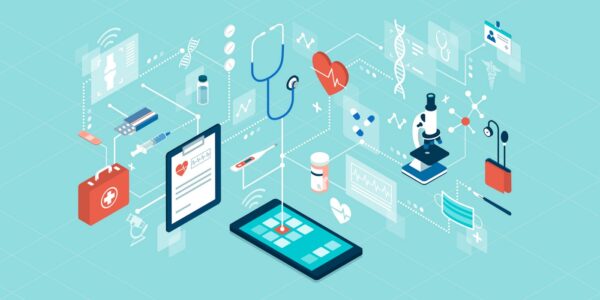Over the following years we will see as healthcare becomes inseparable from digital health, becoming one and the same.
Origen: The End of Digital Health. 2020 ended with a global sigh of relief… | by Heal Capita Medium
Patient Journey from A to Z
…digitisation of our patient files. This brings about strong patient empowerment, as patients gain control over their own medical files. Along with this innovation, sharing of patient info will increase efficiency, reducing redundant testing and improved patient experience with the healthcare system.

Prevention
Today’s patients in Europe are equipped with smartphones, tablets, emails, instant messaging, wearable health devices and telemedicine, some of which will further be equipped with digital biomarkers.
Diagnosis
Patients will see improved diagnostics in the coming years. …The current system is currently inefficient and reductive, it focuses on a combination of analytical and medical interpretation contextualised to the patient’s medical record.
Treatment
Patients will find that digitalisation will provide them with an improved and efficient treatment experience. With AI and access to big data, algorithms can be created to learn how the biological system behaves and can further be used to predict whether a drug treatment will be effective or not.
The process of clinical trials will also be greatly affected. … Patient recruitment can be rapidly expedited thanks to electronic health records. Along with improved timing, decentralization of clinical trials to patient’s own homes with novel technology will further improve patient experience.
Revolutionary Changes
Digitisation is the conversion of information or data into a digital format, like our patient files transforming into electronic health records. Digitalisation, on the other hand, refers more to the organisational and cultural transformation that occurs through digitisation. One of these especially relevant changes from digitalisation is our changing approach to primary healthcare with services and delivery. This will be one of the first and most visible transformation of our healthcare system.
Health Challenges
The world faces a growing, ageing population. With this transition in demographic, we also see a growing burden of chronic disease as people live longer. Cancer, heart disease, ALS, Alzheimer, Parkinson, diabetes the list goes on and on.
As we stand, chronic disease represents 77% of the total burden of disease. Chronic disease is costly as it requires constant monitoring along with treatment and possibly additional support from care givers. … Our current healthcare system is ill-equipped, it lacks the efficiency, money, healthcare providers, and space to deal with such a problem.
However, transitioning into a digital healthcare system comes with its own challenges…
Key Factors to Transition into the Digital Era
To see widespread acceptance of digital health, there are a few key factors that must be addressed:
Patient, Physician, and Regulatory Acceptance
Patient and physician acceptance comes with its own challenges and factors. Patient acceptance has seen steady growth over the past few years as the image below illustrates. From 2016 there is already a big difference in patient requesting digital options from electronic prescription refills to online physician consultations. However, for those who are not so familiar with the digital alternatives a few key strategies should be implemented. To begin, digital understanding must be pushed through education and guides for both physician and patients. An additional educational program must also be combined for the patient focusing on health literacy so that they may make the best-informed decisions regarding their health, and further have fruitful conversations with their physicians. A final key driver for both physicians and patients is ensuring patient privacy, regulatory approval, and proven effectiveness. Health-Tech companies must demonstrate an effective and safe digital alternative.
Staffing
Deloitte published an insightful article arguing for the need to create an office and team that focus specifically on digital transformation. While the article focuses rather on industrial players, a similar strategy should be applied in the healthcare system for hospitals, clinics, and other healthcare providers. …as mentioned before in diagnosis, more staff will need to be able to work with and integrate various modern digital systems and identify relevant information.
Business
To sustain the transition, digital health companies must throw their own weight in and make sure they have an effective product and robust market strategy. …Healthcare providers are looking for products that will effectively aid patients, keep them engaged, and simplify the physician’s life.
…Entering the market requires a robust, strategic, and flexible approach. …widen the scope, to develop a Vertically Integrated Micro-Provider, giving the user end-to-end coverage. This would entail a telemedicine platform that could further provide prescriptions, digital therapeutics, coupled with online consultations, perhaps focused on a particular issue like acne or diabetes.
Partnerships will be another key strategy in successfully entering the market and becoming widely adopted.
Future
…the following step of the digital transformation will be to implement digital health to improve population-level monitoring and prevention along with a general lifestyle change as health awareness and literacy improves.
With electronic health records, researchers can witness large-scale trends and predict outcomes like raise of chronic illness or other issues.
The paradigm shift into digital health or rather just ‘healthcare’ will see widespread societal impact as patients go from being passive to empowered, knowledgeable and active patients.
Through digital health, patients have been given more access to their health file and decisions in their prevention, diagnosis, and treatment.
Physicians will also receive more support in their daily tasks as big data, healthcare apps, and improved technology allows them to be more time efficient and have access to valuable information/data as they go about their tasks of aiding patients.
Hospitals will also see improved results as they are able to triage patients first in their homes with symptom checkers, improve their scheduling and communication across departments and healthcare providers, and further use big data to come up with cost-effective health strategies.
